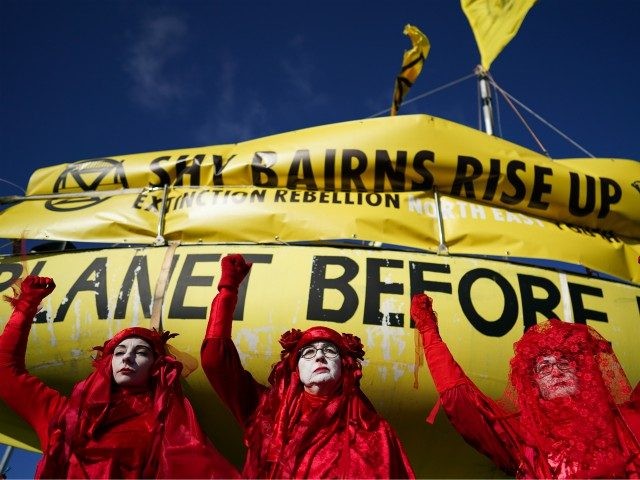At least 45 environmental activists in the United Kingdom were referred to the government’s anti-extremism Prevent strategy between April 2016 and March 2019.
Prevent is the government’s programme which intervenes primarily with young people who are at risk of getting involved in extremist groups or committing acts of terror. Referrals may come from social services, schools, and universities. Once assessed by the police, if warranted, the person may then be progressed onto the Channel programme.
The Times obtained the data via a Freedom of Information request, and a spokesman for the Home Office told the newspaper that the majority of referrals to Prevent did not meet the threshold and were closed. However, the spokesman said that at least one eco-activist was at the level of concern to require escalation onto Channel.
The report comes a year after the eco-extremist group Extinction Rebellion came to prominence for bringing London to a standstill by having sit-ins on the city’s roads and glueing themselves to the London Stock Exchange’s doors, as well as to cars, lorries, and even ‘environmentally-friendly’ public transport.
They have also committed acts of mass vandalism such as smashing windows at Shell Oil’s headquarters and spraying fake blood at the Treasury building. Recently, they ripped up grass outside of the Home Office and the lawn of Cambridge’s Trinity College, with critics condemning the so-called environmental activists for damaging the environment.
The group had also threatened to protest at major British airports with drone attacks, by flying the small unmanned aerial vehicles in nearby airspace which would force control towers to ground all flights over safety concerns.
Delingpole: Eco-Fascists Claim no Link to ‘Corona Is the Cure; Humans are the Disease’ Signs https://t.co/Zg5Or5I0Hl
— Breitbart London (@BreitbartLondon) March 25, 2020
Green lobbyists criticised police following reports from earlier this year revealing at least three regional forces in the UK had either labelled Extinction Rebellion an extremist group in their Prevent-style safeguarding guidelines or identified the group, also known as XR, as a “key threat[]” in a counter-terrorism assessment.
However, a paper published by the think tank Policy Exchange in July 2019 determined that XR’s agenda was “extremist” and that it seeks to “break down civil order” in the UK.
One of the paper’s authors was Richard Wolton, the former head of the Metropolitan Police Service’s Counter-Terrorism Command. The report, Extremism Rebellion, said that “the leaders of Extinction Rebellion seek a more subversive agenda, one that is rooted in the political extremism of anarchism, eco-socialism, and radical anti-capitalist environmentalism.
“The ‘civil resistance model’ they espouse is intended to achieve mass protest accompanied by law-breaking — leading eventually to the breakdown of democracy and the state. Obscured from public view, these objectives mark Extinction Rebellion’s campaign out as an extremist one that seeks to break down the established civil order and liberal democracy in the UK.”
One example of the radicalism espoused from its leadership came from XR’s co-founder Richard Hallam. Hallam made headlines at the end of last year after he dismissed the Holocaust as “just another shit in human history” and again as “just another fuckery in human history”.
Addressing the globally-recognised human rights organisation Amnesty International in February 2019, Hallam had said according to the Policy Exchange report: “We are not just sending out e-mails and asking for donations. We are going to force the governments to act. And if they don’t, we will bring them down and create a democracy fit for purpose.
“And yes, some may die in the process. Some of us have passed through the dark night to the soul and are ready, or at least we are no longer fearful of our fear.”
Officers Fear Arresting Extinction Rebellion Vandals over Threat of Legal Reprisals: Police Representative https://t.co/jSe5bL7Zf8
— Breitbart London (@BreitbartLondon) February 19, 2020

COMMENTS
Please let us know if you're having issues with commenting.